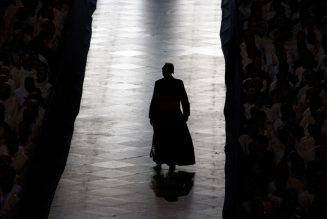By Fr. Jerry Pokorsky ( bio – articles – email ) | Aug 01, 2022
The caustic and always entertaining British novelist Evelyn Waugh observed:
It is better to be narrow-minded than to have no mind, to hold limited and rigid principles than none at all. That is the danger which faces so many people today—to have no considered opinions on any subject, to put up with what is wasteful and harmful with the excuse that there is “good in everything”—which in most cases means the inability to distinguish between good and bad.
The pseudo-sophisticated resurgent use of “paradigm shifts” in contemporary moral theology undermines orthodox Catholic teaching on intrinsically evil acts, blurring the distinction between good and evil.
The Pontifical Academy for Life has released the results of a 2021 conference suggesting a “paradigm shift” in moral theology. Analysts suggest the report may become the foundation of a papal encyclical effectively redefining the intrinsic evil of contraception and other sins. Archbishop Vincenzo Paglia, the academy’s president since 2016, describes the “paradigm shift” in moral theology. He says the shift is: “both descriptive and conceptual, as it follows a pattern that is both argumentative and narrative, theoretical and sapiential, phenomenological and interpretative.” The new paradigm promises to use big words.
Here we go again.
Many of us recognize the “new paradigm” as a rehash of the old, dissident, and discarded paradigm of proportionalism. Human Sexuality—published by Anthony Kosnik in 1977 under the auspices of the Catholic Theological Society of America—represents the same “paradigm shift” that occurred shortly after Vatican II. It reads like the playbook for all that has happened over the last 50 years. Msgr. George Kelly cited several disturbing assertions in his old book, Battle for the American Church. (The following bullet points are taken from that book, pages 105-106):
- “Concerning revelation, we [so the authors say] cannot guarantee the exact words of Jesus” (p. 19) and “Scripture is not even concerned with sexuality as such” (p. 30).
- “The question of artificial contraception has not yet found a definitive resolution in the Church” (p. 126). Therefore, the use of contraception can be a morally sound decision.
- “Sterilization, like that of contraception, is still far from a universally acceptable and definitive resolution in the Church” (p. 134). Therefore the options of sterilization are with the interested parties.
- Artificial insemination with semen from a man other than the husband cannot be prohibited (p. 139).
- While “mate swapping” is not ideal from a scriptural standpoint, the final word on this subject has not been said (p. 149).
- Adulterous relationships generally offend against the quality of fidelity, “but there may occasionally arise exceptions” (p. 151).
- Premarital intercourse may be justified if it represents “a loving relationship and some measure of natural commitment before sexual involvement” (p. 166).
- Christian “homosexuals have the same rights to love, intimacy, and relationships as heterosexuals” (p. 214) “and to receive Holy Communion too” (p. 215).
- Masturbation is not objectively and seriously wrong (p. 228).
- Bestiality is pathological “when heterosexual outlets are available” (p. 230).
- Therapists and patients may enjoy sexual intercourse, if in fact it “results in making the patient whole” [no citation provided].
Msgr. Kelly writes, “The manner in which this study was conceived, organized, evaluated, and published during the presidency of five CTSA theologians (John Wright, S.J., of Berkeley; Richard McBrien of Boston College; Luke Salm, F.S.C., of Manhattan College; Avery Dulles, S.J., of Catholic University; and Agnes Cunningham, S.S.H.M., of Mundelein Seminary) suggests that anything but the rigorous canons of scientific scholarship was followed.” (p. 107)
The Sacred Congregation for the Doctrine of the Faith condemned the book in 1979. Here is an excerpt from the Vatican statement:
The authors nearly always find a way to allow for integrative growth through the neglect or destruction of some intrinsic element of sexual morality, particularly its procreative ordination. And if some forms of sexual conduct are disapproved, it is only because of the supposed absence, generally expressed in the form of a doubt, of “human integration” (as in swinging, mate-swapping, bestiality), and not because these actions are opposed to the nature of human sexuality. When some action is considered completely immoral, it is never for intrinsic reasons, on the basis of objective finality, but only because the authors happen not to see, for their part, any way of making it so for some human integration. This subjection of theological and scientific arguments to evaluation by criteria primarily derived from one’s present experience of what is human or less than human gives rise to a relativism in human conduct which recognizes no absolute values. Given these criteria, it is small wonder that this book pays such scant attention to the documents of the Church’s Magisterium, whose clear teaching and helpful norms of morality in the area of human sexuality it often openly contradicts.
At the same time, the Congregation cannot fail to note its concern that a distinguished society of Catholic theologians would have arranged for the publication of this report in such a way as to give broad distribution to the erroneous principles and conclusions of this book and in this way provide a source of confusion among the people of God.
I would be grateful to Your Excellency for bringing this letter to the attention of the members of the Episcopal Conference.
[signed] Franjo Cardinal Šeper, Prefect
In an early work, Evelyn Waugh prophesized:
Every effort was made to encourage the children at the public schools to ‘think for themselves.’ When they should have been whipped and taught Greek paradigms, they were set arguing about birth control and nationalization. Their crude little opinions were treated with respect. Preachers in the school chapel week after week entrusted the future to their hands. It is hardly surprising that they were Bolshevik at 18 and bored at 20.
At a minimum, we need not treat the crude paradigm shift opinions of the Pontifical Academy for Life with respect.
Sound Off! CatholicCulture.org supporters weigh in.
All comments are moderated. To lighten our editing burden, only current donors are allowed to Sound Off. If you are a current donor, log in to see the comment form; otherwise please support our work, and Sound Off!

Join Our Telegram Group : Salvation & Prosperity










